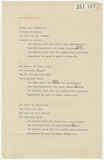Bertolt Brecht: Hollywood Elegies, typescript (1942)
Bertolt Brecht: Hollywood Elegies, typescript (1942)
das dorf hollywood ist entworfen nach den vorstellungen
die man hierorts vom himmel hat. hierorts
hat man ausgerechnet, dass gott
himmel und hölle benötigend, nicht zwei
etablissements zu entwerfen brauchte, sondern
nur ein einziges, nämlich den himmel. dieser
dient für die unbemittelten, erfolglosen
als hölle.[the village of Hollywood was planned according to the notion
people in these parts have of heaven. In these parts
they have come to the conclusion that God
requiring a heaven and a hell, didn’t need to
plan two establishments but
just the one: heaven. It
serves the unprosperous, unsuccessful
as hell.]
Bertolt Brecht, Hollywood Elegies, 1942
The writer Bertolt Brecht saw life in Hollywood as one dominated by consumer goods and money. He had never experienced capitalism, which he fought against in Germany, in this form before. In an unpublished typescript from 1942, which can be read as a study for the Hollywood Elegies, he wrote: “The stones look like bread, the puddles like natural springs. But it is banknotes that are eaten and sweat that is drunk here.” (Brecht, 1976, Vol. 12, p. 399 (ed. trans.)). The response of Brecht’s friend, the composer Hanns Eisler, who thought the writer seemed to be tired and a little depressed: “It is the ideal place to write elegies.” Only a short time after, this is exactly what Brecht gave him: “He (Brecht) … gave me an envelope with around 30 poems in it and said: ‘Take a look, maybe you’ll find something worth using in there.’ And so, Brecht obviously intended them to be set to music. The envelope contained some yellow typewritten pages. I had a look, then went to Brecht and said: ‘Hey, Brecht, these are brilliant!’ His reply was, ‘Really? Do you think they’re workable?’ That’s all he said, ‘workable’, that’s the word he used… I immediately composed the music for them and played it to him. He liked it.” (Eisler, 1975, p. 143 (ed. trans.))
In addition to a general critique of capitalism, the Hollywood Elegies also contain some thoughts about the difficult conditions in exile.





